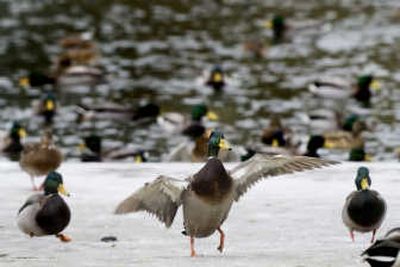Adopt-a-duck program gets huge response

Within hours of Spokane parks officials announcing a new adopt-a-duck program on Monday, the phones at city offices began ringing.
Domestic and mixed-breed ducks have overpopulated popular park waterways, including Riverfront Park and the duck pond at Manito Park where they are causing pollution problems.
“We got a huge response,” said Steve Nittolo, a supervisor at Manito who has proposed cleaning up the duck pond by reducing populations and discouraging hand feeding.
On Monday, the Parks Department issued a press release announcing a program to adopt out ducks from Manito, Cannon Hill and Riverfront parks. The U.S. Department of Agriculture’s wildlife services agency is going to help parks officials decide which ducks are not wild and, thus, eligible for adoption, Nittolo said.
Nearly 20 people who have ponds, small farms or other suitable areas contacted parks officials by Tuesday morning. “It’s amazing,” Nittolo said of the quick response.
One resident offered to take as many ducks as possible. That left Nittolo worrying he wouldn’t have enough ducks to go around. “I don’t want people fighting over them,” he said, adding his goal now is to have a pair of ducks for everyone who wants them.
Fecal waste from ducks and geese has been fouling park lawns and waterways over the years. The problem is caused in part by the bread and other food fed to the birds by residents who think they are helping wildlife.
Wild ducks, mostly mallards, are drawn to the food supply.
According to parks officials, “Seemingly helpful members of the public who continue to feed the ducks in city parks are really doing the birds more harm than good. Ducks, of course, will stick around when fed, and with an ongoing artificial supply of food, a huge overpopulation of ducks has resulted. These ducks end up competing for food and space in park ponds that are way too small to adequately support their growing population. Overcrowding can also result in a spread of disease among the ducks which can also potentially spread to humans.”
Mixed-breed ducks that may be capable of flying will have their wings clipped before being adopted out to prevent interbreeding with wild populations, Nittolo said.
Reducing the population of ducks at Manito Park is part of broader plan to improve the ecology of the duck pond. Nittolo has proposed adding a stream feature to circulate water and increase oxygen content in it. He also wants to see the bank redeveloped with natural plantings to reduce wear and tear along the shoreline.